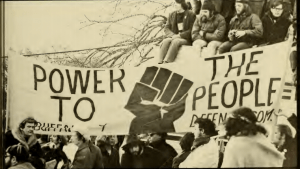Post Author: Stephanie Strong
In order to understand the Political Science department at James Madison University during the 1970s, one must first understand the political climate of the nation and world as a whole during the decade. From the Watergate scandal, to a failing economy, to outspoken public disapproval of the Vietnam War, the 70’s was a decade of a never ending tumultuous political climate.

One of the most pervasive elements of popular opinion during the 1970s was an intense distrust of the federal government. Richard Nixon was, initially, the figurehead of this belief. “The Nixon era seemed to initiate a new, more conservative era in American politics” even though it was apparent that “he embraced the idea that a humming economy was the responsibility of the federal government and that the White House should actively intervene in economic affairs” (Schulman 25). Nixon promised to satisfy those with extreme distrust of government interference while also curing the ailing economy and setting the conflict in Vietnam.
It is no secret that, while Nixon managed to accomplish many of his and his party’s goals for the country, the stigma of the Watergate Scandal is what has defined his presidency for many. Nixon is often remembered only for two things; Watergate and the words “I am not a crook”.
Naturally, this political climate had a profound effect on the Political Science department at Madison College. From course offerings to class discussions, current politics molds the experience of the student of political science no matter the decade. Throughout the 1970s, because of its recent separation from the department of social sciences, the political science department of Madison College built itself into a modern, respected, and competitive department. Students were the primary focus of all innovations and the department made an effort to enhance student’s lives inside and outside the classroom. Despite struggling through the growing pains of being a newly established department, the political science department at James Madison University was able to offer up-to-date and interesting courses, enhance its graduate course offerings, and become heavily involved and influential in campus life outside the classroom.
These improvements placed Political Science at Madison College on the pathway toward becoming the progressive and competitive department that it is today.
Works Cited:
“President Richard Nixon: Second Inauguration.” YouTube. Nixon Foundation, 30 July 2010. Web. 16 Feb. 2013. <http://www.youtube.com/watch?v=b5WPaeeDdK0>.
“Richard Nixon – “I’m Not a Crook” [HIGHER QUALITY – FULL VERSION].” YouTube. N.p., 15 July 2009. Web. 16 Feb. 2013. <http://www.youtube.com/watch?v=sh163n1lJ4M>.
Schulman, Bruce J. The Seventies: The Great Shift in American Culture, Society, and Politics. New York: Free, 2001. 24-25. Print.
“The Bluestone: 1971.” Us.archive.org. James Madison University, n.d. Web. 16 Feb. 2013. <http://ia700702.us.archive.org/34/items/bluestone197163jame/bluestone197163jame.pdf>.
